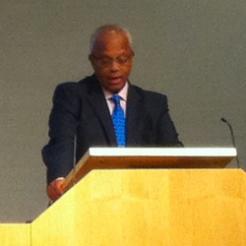KPMG’s global CSR chief got short shrift from an audience of charity people yesterday when he remarked that the voluntary sector ought to ditch its “bunker” mentality and learn from the private sector way of doing things.
Lord Hastings of Scarisbrick used his address to the Westminster Social Policy Forum to implore the voluntary sector to take a “business-driven approach to outcomes as opposed to a socially-driven approach of good intentions”.
He said: “I believe passionately that if we are going to see the dramatic transformation we want to see in the charitable sector in this country and elsewhere, then we have to face the fact that something of a new paradigm shift has to take place.”
He said that what he had learned in his 30 years of sector involvement as a founding trustee of Crime Concern, trustee of Millennium Promise, vice president of Unicef and of Tearfund, is that “the time for consistent squabbling has to be over”.
For too long the fight for survival among charities has taken precedence over a focus on purpose-driven activity, he claimed.
“What I’ve learned from sitting on private sector boards, both BT and Vodafone, is to see the way in which companies change the emphasis of a charitable direction. What they do is to stay focused on achievable directional outcomes within timescales and weigh up how to engage maximum public emotion at the same time.
“It’s the phenomenal power of branding and marketing brought alongside passionate interest in seeing society change,” he said. “In my experience of both big and small charities I’ve seen very little of that emphasis of engagement.”
Hastings said the charity sector could not continue to stand apart from engagement with both the private sector and the government: “The three things need to be equal legs of a stool - only then can we achieve outcomes, solutions, deliverables and ends.”
He issued what he called “a big wake-up call” to all three sectors. The charity sector must “stop being bunker-minded”. The corporate world must accept that “duties to public purpose are intrinsic to your profit-making activities”. Thirdly, he said, government should “stop separating us and allow us to join together for common outcomes”.
But Hastings’ comments did not sit easily with the voluntary sector audience.
Deborah Price, head of legal at the British Heart Foundation, told Hastings she didn’t know a single charity that doesn’t seek to work with the private sector: “So I don’t think it’s right to say this is a wake-up call, the charity sector knows that already. And the charity sector has been focused on outcomes for as long as I can remember. The fact is we have to do more for less now, which is very different.”
Helen Mary Jones, chief executive of Youth Cymru, said the three legs of the stool he referred to “are not equal, not balanced, and all have very different agendas”.
She said Youth Cymru works with lots of corporates and is grateful for their support, but always has to take care that its charitable purpose doesn’t get skewed by their corporate agenda.
Institute of Fundraising chief executive Peter Lewis said he’d worked in all three sectors and could vouch for the fact that neither of the other two live up to the same standards on transparency or impact as the charity sector. He also pointed out that of the £36bn that comes into charity sector in the UK, less than £3bn, including in kind, currently comes from the private sector.









